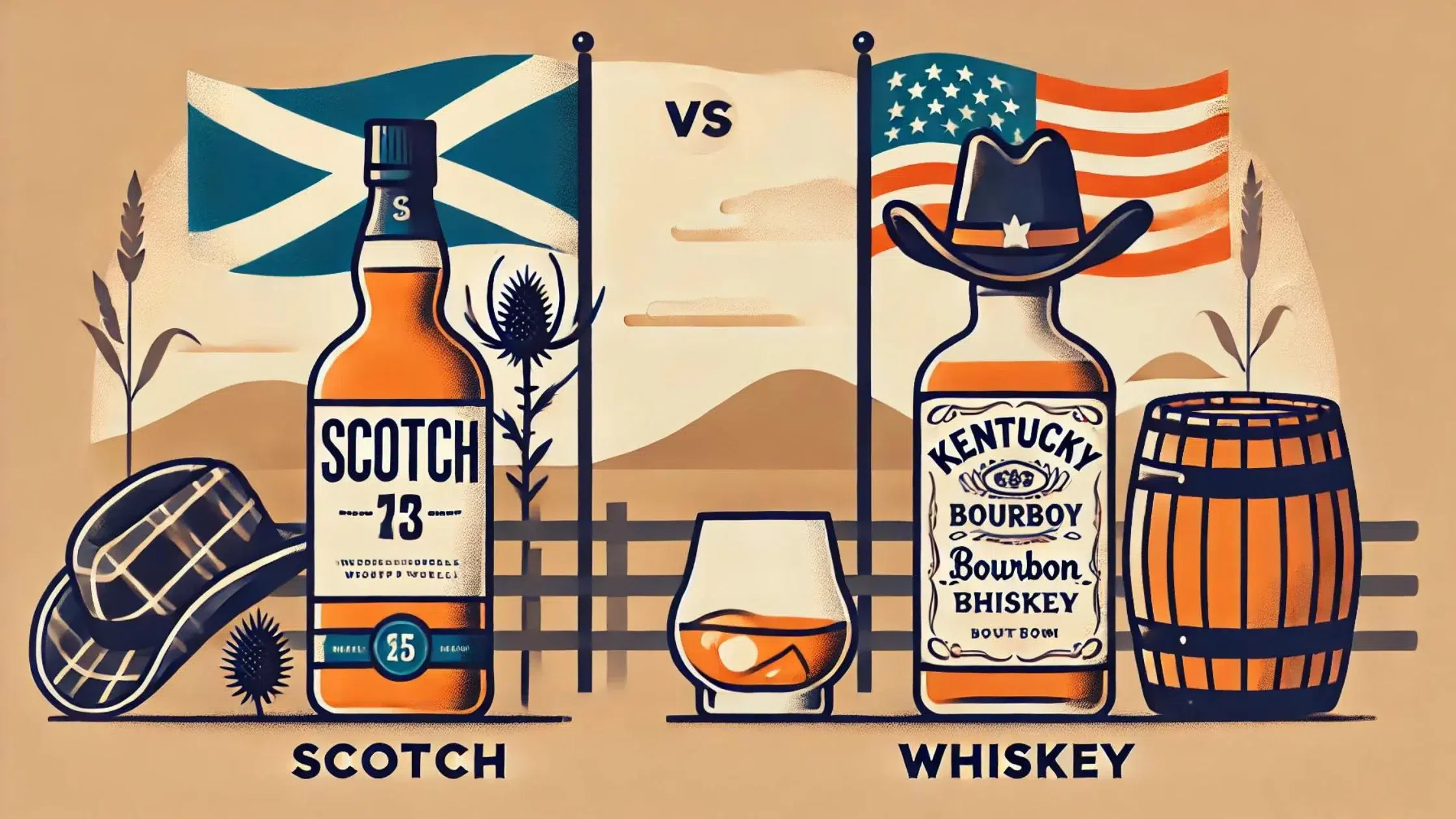Curious about the difference between Scotch and whiskey? You’re not alone! These two spirits often get lumped together, but they have some key differences that make each unique. Whiskey is a broad category that includes various styles from around the world, while Scotch is a specific type of whiskey made in Scotland under strict regulations. This article will dive into what sets Scotch apart, exploring its distinct characteristics, history, and the meticulous process that goes into crafting this celebrated spirit. Whether you’re a seasoned enthusiast or a curious beginner, understanding these differences will enhance your appreciation for both.
Understanding Whiskey
Whiskey, a distilled alcoholic beverage made from fermented grain mash, encompasses a wide variety of styles, each with its own unique characteristics. The grains used can include barley, corn, rye, and wheat, which significantly influence the flavor and texture of the final product. Whiskey’s rich history spans centuries and continents, evolving from a medicinal elixir to a cherished global commodity.
This evolution is marked by the development of distinct whiskey-making traditions in countries such as Scotland, Ireland, the United States, and Japan, each contributing to the diverse spectrum of whiskey flavors and styles. The production process, aging methods, and the geographical origin of the whiskey are critical factors that define its identity, ranging from the smooth and mellow Irish whiskeys to the bold and smoky Scotch whiskies and the sweet, corn-rich American bourbons. Understanding whiskey requires an exploration of its multifaceted nature, covering the intricacies of its production, the significance of aging, and the impact of terroir on its flavor profile.
Definition of Whiskey
Whiskey is defined as a spirit distilled from fermented grain mash, with variations including barley, corn, rye, and wheat. The defining characteristics of whiskey encompass its distillation process, aging in wooden casks, and the nuanced flavors influenced by the type of grains used and the aging process. The term whiskey (or whisky, in Scottish and Canadian English) encapsulates a range of spirits, from the smooth and versatile bourbon to the deep and complex single malt Scotch.
History and Origins of Whiskey
The origins of whiskey trace back to ancient times, with distillation practices believed to have been brought to Ireland and Scotland by traveling monks around the 4th and 5th centuries. Initially used for medicinal purposes, whiskey gradually became a staple in social and cultural gatherings. The art of whiskey-making evolved over centuries, with significant milestones including the development of the pot still and the establishment of the first licensed distillery in the early 17th century.
The history of whiskey is a tapestry of innovation, regulation, and global expansion, reflecting the spirit’s enduring appeal and the rich traditions of its various styles.
Understanding Scotch
Scotch, a distinguished member of the whiskey family, is exclusively produced in Scotland, adhering to meticulous legal standards that preserve its heritage and quality. This spirit is renowned for its diverse range of flavors, which are deeply influenced by the region of production, the choice of grains, and the specific aging process in oak barrels. Scotch is categorized into several types, including Single Malt, Single Grain, Blended Malt, Blended Grain, and Blended Scotch Whisky, each offering a unique taste profile and distillation process.
The essence of Scotch lies in its connection to Scottish land, water, and air, contributing to its unique characteristics and making it a revered spirit worldwide. The understanding of Scotch involves exploring its rich history, the art of its production, and the stringent regulations that ensure its status as a premium whiskey.
Definition of Scotch Whisky
Scotch Whisky, often simply known as Scotch, is a distilled spirit made primarily from malted barley and water, aged in oak barrels for a minimum of three years within the borders of Scotland. Its unique identity is safeguarded by strict regulations that dictate every step of its production process, from the sourcing of ingredients to the distillation and aging methods. Scotch is celebrated for its diverse flavor profiles, which can range from light and floral to rich and peaty, reflecting the characteristics of the region in which it was produced.
History and Origins of Scotch
The history of Scotch Whisky is deeply interwoven with Scottish culture and dates back to the late 15th century, with the first written record of its distillation appearing in the Exchequer Rolls of Scotland in 1496. However, it is believed that the practice of distilling whisky in Scotland began several centuries earlier, possibly introduced by monks from Ireland. Over the centuries, Scotch Whisky evolved from a cottage industry into a globally recognized symbol of Scottish heritage.
The 18th and 19th centuries saw significant developments, including the introduction of the continuous still, which revolutionized Scotch production, leading to the establishment of many of the renowned distilleries that are still in operation today. The rich history of Scotch is not only a testament to its enduring appeal but also to the craftsmanship and tradition that define this iconic spirit.
Key Differences Between Scotch and Whiskey
While both Scotch and whiskey embody the rich tradition of distilling, they are distinguished by several key factors that define their unique identities. The primary difference lies in the geographical origin; Scotch is exclusively produced in Scotland, following strict guidelines that dictate its production, including the use of malted barley and aging in oak barrels for at least three years. In contrast, whiskey can be produced anywhere in the world, with diverse types such as Irish whiskey, American bourbon, and Japanese whisky each adhering to their own set of rules regarding ingredients, distillation methods, and aging processes.
Another significant distinction is the flavor profile. Scotch is renowned for its wide range of flavors, from the smoky and peaty notes of Islay Scotch to the light and floral characteristics of Speyside varieties. Whiskey, on the other hand, offers a broad spectrum of flavors influenced by local ingredients, climate, and production techniques, resulting in the sweet and smooth profile of American bourbon or the soft and fruity notes of Irish whiskey.
These differences highlight the diversity within the world of whiskey and Scotch, inviting enthusiasts to explore the rich flavors and storied histories of each.
Ingredients
The ingredients used in Scotch and whiskey play a pivotal role in their distinct identities. Scotch must be made from malted barley and water, with some varieties allowing a small percentage of other grains. Whiskey, however, can be produced from a broader range of grains, including corn, rye, wheat, and barley, leading to a wide variety of styles and flavors.
Production Process
The production process of Scotch involves malting the barley, fermenting the mash, and then distilling it in pot stills, followed by a minimum of three years aging in oak barrels in Scotland. Whiskey production varies more widely, with different countries and regions adopting unique distillation methods, types of stills, and aging requirements, contributing to the diverse spectrum of whiskey styles.
Flavor Profiles
Scotch is celebrated for its complex flavor profiles, ranging from the peaty and smoky notes of Islay malts to the light and floral tones of Speyside Scotches. Whiskey flavors are equally varied but are influenced by the specific grains used, the distillation process, and the aging environment, resulting in the sweet and rich profiles of American bourbons or the smooth and delicate notes of Irish whiskeys.
Geographical Indications
Scotch is geographically protected, meaning it must be produced in Scotland to bear the name. Whiskey, on the other hand, does not have such strict geographical indications, allowing for a global tapestry of spirits that reflect their local heritage, ingredients, and production techniques. This global diversity includes American bourbon, which must be produced in the United States, and Irish whiskey, which is made in Ireland, each with their own set of regulations and standards.
Regulations and Legal Definitions
The world of whiskey is governed by a complex framework of regulations and legal definitions that ensure the quality, authenticity, and heritage of these spirits. For Scotch, the laws are particularly stringent, mandating that it must be distilled and aged in Scotland for at least three years in oak barrels, among other specifications. These regulations are enforced by the Scotch Whisky Association, which protects Scotch’s integrity worldwide.
In contrast, whiskey production in other countries follows their own set of rules. For example, American bourbon must be made from a mash bill of at least 51% corn and aged in new charred oak containers, while Irish whiskey requires three years of aging in wooden casks. Each country’s legal framework reflects its unique whiskey-making tradition, contributing to the rich diversity of the whiskey world.
These legal definitions not only safeguard the spirit’s quality but also help consumers understand the craftsmanship behind each bottle.
Legal Requirements for Scotch Production
Scotch production is bound by strict legal requirements to ensure its authenticity and quality. It must be produced in Scotland from water and malted barley, and it may include other whole grains. The spirit must be distilled to an alcohol content of less than 94.8%, aged in oak barrels in Scotland for at least three years, and bottled at a minimum of 40% alcohol by volume.
These regulations, enforced by the Scotch Whisky Association, preserve the traditional methods and characteristics that define Scotch whisky.
Legal Definitions of Different Types of Whiskey
The legal definitions of whiskey vary significantly across different regions, each reflecting its unique heritage and production techniques. American bourbon, for instance, is legally defined as a whiskey made from a grain mixture that is at least 51% corn, aged in new charred oak barrels, without any minimum aging period for the designation of straight bourbon. Irish whiskey must be distilled and aged in the Republic of Ireland or Northern Ireland from a yeast-fermented mash of cereal grains, aged in wooden casks for at least three years, and bottled at no less than 40% alcohol by volume.
Japanese whisky, though not as rigidly defined by law, generally adheres to production methods similar to those of Scotch whisky, focusing on the quality and purity of ingredients. These legal distinctions ensure that each whiskey type maintains its distinct flavors and traditions.
FAQs
Navigating the world of Scotch and whiskey can often lead to a myriad of questions, given their rich history, diverse production methods, and intricate flavor profiles. Whether you’re a seasoned aficionado or a curious newcomer, understanding the subtleties between Scotch and whiskey is key to appreciating their unique qualities. Questions such as “Is all scotch whiskey?” and “Can whiskey be called scotch?” delve into the legal and geographical nuances that define these spirits.
Meanwhile, inquiries about the best ways to store and enjoy Scotch or whiskey touch upon the practical aspects of consumption, aiming to enhance the tasting experience. This section addresses these common queries and more, offering insights that illuminate the fascinating world of Scotch and whiskey.
Is all scotch whiskey?
Yes, all Scotch is whiskey, but not all whiskey is Scotch. Scotch is a type of whiskey that must be produced in Scotland and meet specific legal requirements regarding ingredients, distillation, and aging.
Can whiskey be called scotch?
No, whiskey cannot be called Scotch unless it is produced in Scotland according to the strict guidelines that govern Scotch production. This includes the use of malted barley, distillation in pot stills, and aging in oak barrels for at least three years.
How should scotch be stored?
Scotch should be stored upright in a cool, dark place to prevent deterioration. Unlike wine, Scotch does not benefit from aging in the bottle, so exposure to light, extreme temperatures, or air can negatively affect its flavor.
What is the best way to drink scotch or whiskey?
The best way to drink Scotch or whiskey depends on personal preference. It can be enjoyed neat, with a drop of water to open up the flavors, or on the rocks. Some prefer it in cocktails to complement its complex profiles.
Experimenting with different methods will help you discover how you enjoy it most.





